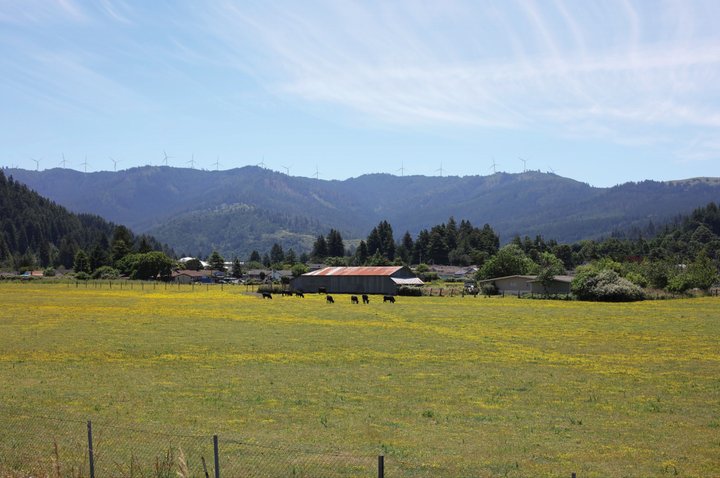
Simulated view of proposed wind turbines from Rio Dell. | Image from the Draft Environmental Impact Report.
PREVIOUSLY:
- Large-Scale Wind Farm South of Scotia Should Be Up and Running in Roughly Two Years, Project Director Says
- Wind Energy Project Near Scotia Would Impact Birds and the View, Report Finds; Public Scrutiny Invited
- OP-ED: Wiyot Tribe Urges People to Cast a Wary Eye on Ridgetop Wind Power Project, Submit Comments on its Environmental Impact Report
- Humboldt Wind Energy Project Proponents Give Presentation to Skeptical Crowd in Ferndale
- County Extends Public Comment Period for Humboldt Wind Energy Project
- Rio Dell City Government is the Latest Organization to Give the Terra-Gen Wind Power Project a Big Thumbs Down
# # #
The board of the Redwood Coast Energy Authority (RCEA) on Thursday unanimously directed staff to negotiate a power purchase agreement with renewable energy company Terra-Gen, along with two other green-electricity producers.
If signed by the board later this summer, the agreement would put to rest at least one criticism being tossed around by skeptics of Terra-Gen’s proposed Humboldt Wind Energy project — namely, that the power produced by the ridge-top turbines wouldn’t even be consumed locally.
Under the proposal, RCEA, the local joint powers authority that manages Humboldt County’s community choice power aggregation program, would enter into a 15-year contract to purchase up to 90 megawatts, or about two-thirds of the capacity from Terra-Gen’s planned Humboldt Wind energy project, which includes up to 60 turbines atop Monument and Bear River Ridges near Scotia.
The board also directed staff to negotiate two other renewable energy contracts. One would be a 12-year deal for up to 50 megawatts via a Fresno County solar energy project being developed by San Francisco-based Candela Renewables LLC, and the other would be a 15-year agreement for the full 5.5-megawatt capacity of Snow Mountain Hydro LLC’s existing Cove hydropower project in Shasta County.
RCEA Executive Director Matthew Marshall said the agency issued a request for proposals a while back, and the review team awarded preference points for local and regional projects. However, of the 13 proposals received just a handful, including the one from Snow Mountain Hydro, came from within a two-county radius, and Terra-Gen’s was the only one from within Humboldt County.
The review team consisted of RCEA staff members along with experts from The Energy Authority (TEA), Schatz Energy Research Center, TRC Advanced Energy Services, and the Humboldt County Planning Department.
“I think that the timing of this project is pretty much perfect,” Marshall said in reference to the Humboldt Wind Energy proposal. The state is currently requiring electricity providers to enter into long-term contracts for renewable power — an initiative aimed at boosting investment in green energy — and with the constraints of Humboldt County’s electricity grid, Marshall said, RCEA needed to find a new, local source if it hopes to achieve its goal of providing 100 percent renewable electricity to Humboldt County consumers by 2030.
“The timing is hitting us in stride,” Marshall said.
In recent weeks, many have voiced concerns about the Humboldt Wind Energy project, especially residents of Ferndale and Rio Dell. In fact, the Rio Dell City Council issued a “strongly worded response” to the draft environmental impact report, officially opposing the project. They argues that it was being “fast-tracked” in a way that precluded appropriate technical studies and public input.
And yet Thursday’s board vote was unanimous, meaning both the Ferndale representative (City Councilmember Robin Smith) and the Rio Dell representative (City Councilmember Frank Wilson) gave their approval to pursue a contract.
The Outpost‘s attempts to reach those two on Friday were unsuccessful, but Board Chair Michael Winkler, a vocal proponent of the wind farm, said he and his fellow board members felt the project would be “beneficial enough to customers and to Humboldt County” that a contract is worth pursuing, “despite strong opposition from some in their communities.”
Winkler said that if all the contracts are approved, RCEA would begin receiving power from Snow Mountain Hydro in 2021, Terra-Gen in 2022 (when the turbines are expected to start running) and Candela Solar in 2023.
“All together, assuming everything goes as planned, about 80 percent of the electricity delivered to customers from RCEA would come from two biomass plants, the Terra-Gen project and [various] solar projects,” Winkler said.
RCEA’s long-term plans involve procuring energy from an offshore wind project.
“Wind is our greatest resource here,” Marshall said, noting that Humboldt is not the sunniest place in the state.
And while the proposed offshore wind farm is still several years off, at least, Winkler said the technology will eventually make the agency an exporter of electricity while allowing local projects to switch from petroleum-based fuels to green energy.
Marshall said staff will now begin negotiating terms for final power purchase agreements with the three companies, and they hope to bring the matter back for board consideration at the August meeting.
CLICK TO MANAGE